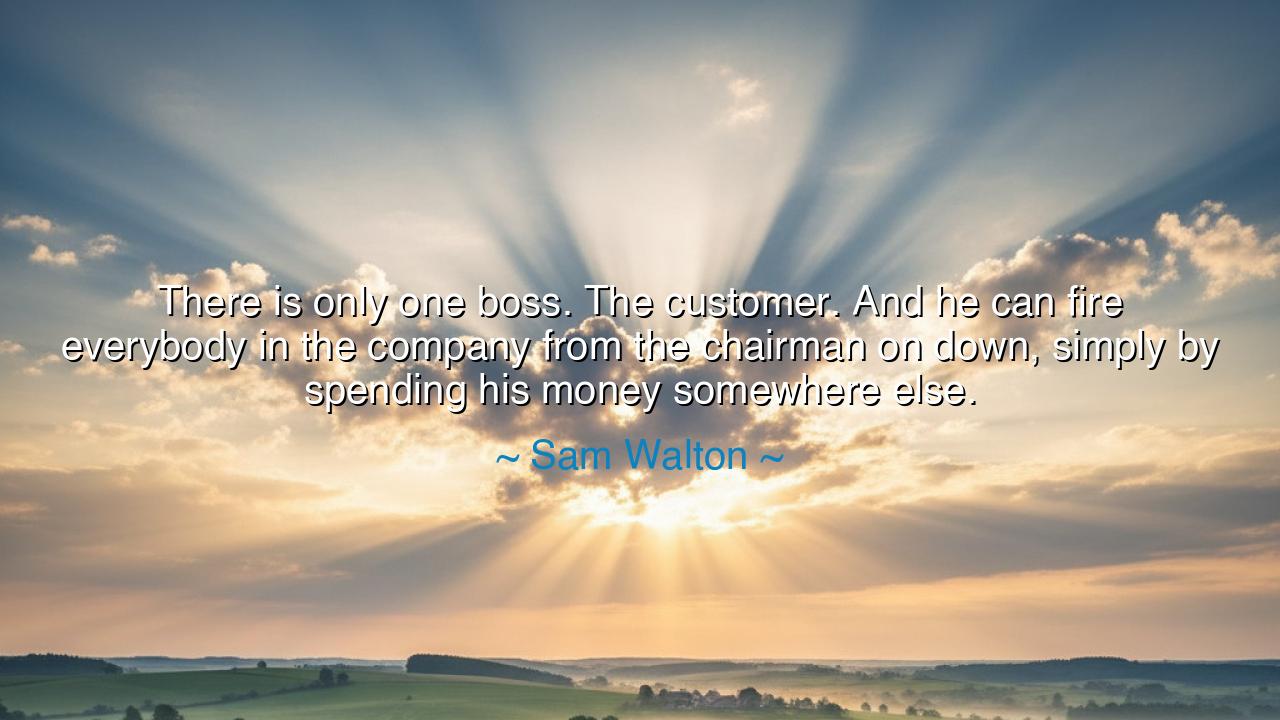
There is only one boss. The customer. And he can fire everybody
There is only one boss. The customer. And he can fire everybody in the company from the chairman on down, simply by spending his money somewhere else.






The gentle hum of the café filled the air, blending with the rhythmic tapping of rain against the window. Jack sat across from Jeeny, his coffee cup cradled in his hands, his gaze drifting toward the rain-soaked streets. Jeeny, sitting opposite him, seemed lost in thought, her fingers lightly tracing the rim of her cup.
Host: After a brief pause, Jeeny spoke, her voice reflective, with a touch of intrigue.
Jeeny: “I came across a quote from Sam Walton today that really made me think. He said, ‘There is only one boss. The customer. And he can fire everybody in the company from the chairman on down, simply by spending his money somewhere else.’ What do you think he’s trying to say here? Is he emphasizing the power of the consumer and how important customer satisfaction is?”
Jack: He looked up, a slight smile forming on his face. “Yes, I think Walton is highlighting the ultimate reality of business—the customer is king. In his view, businesses exist to serve the customer, and if they don’t, the customer has the power to take their money elsewhere, which is essentially firing the business. Walton is reminding us that profit and success in any company aren’t guaranteed; they depend on satisfying and retaining customers. The customer holds the ultimate power because, without their business, nothing else matters—no matter how high up you are in the company.”
Jeeny: “Exactly. Walton is cutting through the corporate hierarchy to make a very clear point: no matter how powerful or influential a company’s executives or board members are, they are at the mercy of the customer. If the customers aren’t happy, they’ll stop spending their money, and that will drive the company out of business. It’s a humbling reminder that, in the end, the success of a business hinges on customer satisfaction and delivering value to the people who are willing to pay for it.”
Host: The rain outside had softened, leaving a quiet stillness between them. Jack shifted slightly, his fingers still resting on his coffee cup as he continued.
Jack: “And I think Walton is also pointing out the dynamic nature of business. No matter how established a company is, it has to be adaptable to the needs and preferences of its customers. The power of choice is in the hands of the consumer, and businesses need to be aware of that. If they get complacent or fail to innovate or meet customer needs, customers will find alternatives. Walton’s statement is a reminder that businesses can’t rest on their laurels—they must constantly evolve and provide value.”
Jeeny: “Yes, and there’s also a humility in Walton’s statement. He’s saying that no matter how much power a company’s leaders might feel they have, the customer ultimately holds the real power. It’s a recognition that customer loyalty is earned, not assumed. The way a company treats its customers—how it responds to their needs and how it offers value—is what keeps them in business. Walton is emphasizing that businesses have to be customer-centered, because without the customer, the business simply doesn’t survive.”
Host: The conversation seemed to deepen, as they both reflected on the nature of business and customer relationships. Jack set his coffee cup down gently, his expression softening.
Jack: “Exactly. Walton’s words speak to the heart of customer-centricity. It’s easy to get caught up in the operations and strategies of a business, but the ultimate measure of success is whether or not the customers are happy. They are the ones who determine whether the company thrives or fails. And that’s why businesses should always listen to their customers, understand their needs, and continually deliver products and services that meet those needs. The customer’s decision where to spend their money is the ultimate feedback loop.”
Jeeny: Her smile was small but filled with understanding. “Yes. Walton’s quote is a reminder that in business, the customer isn’t just one part of the equation—they are the most important part. Without them, nothing else works. The best businesses are the ones that never forget that their success is directly tied to the value they offer to their customers, and they continuously work to earn that trust and loyalty.”
Host: The rain had stopped, leaving a quiet calm in the café. Inside, Jack and Jeeny sat in the realization that business success is driven by the needs and satisfaction of the customer. Sam Walton’s words remind us that the customer holds the ultimate power—if they are not satisfied, they can take their business elsewhere. Businesses must constantly adapt, innovate, and provide value to stay relevant and thrive. The relationship with the customer is foundational to success, and it’s a dynamic that requires continuous attention and respect.






AAdministratorAdministrator
Welcome, honored guests. Please leave a comment, we will respond soon